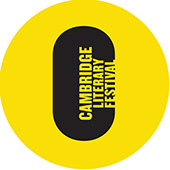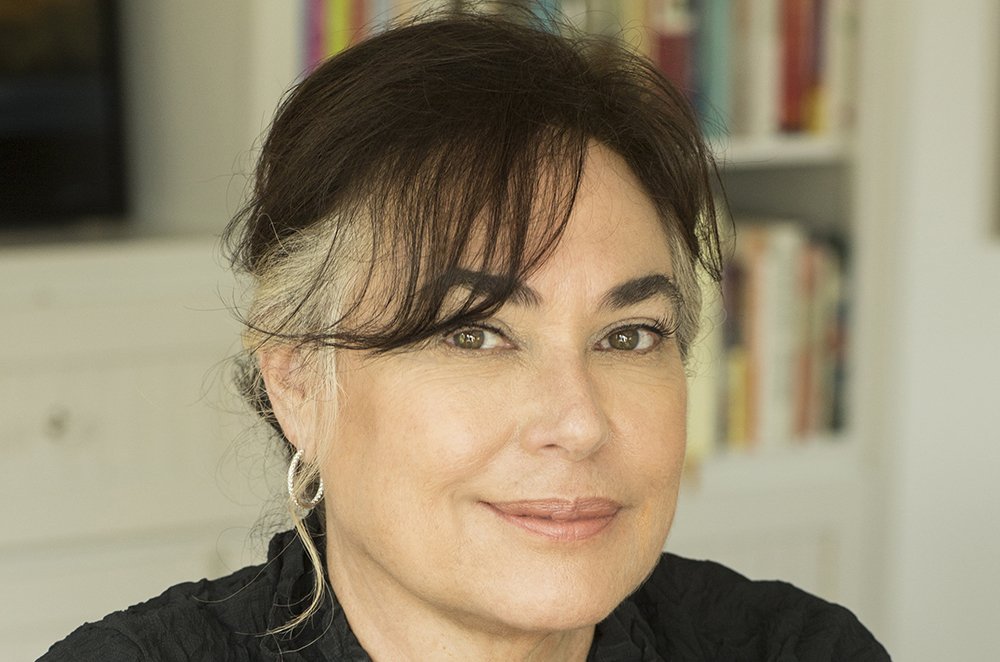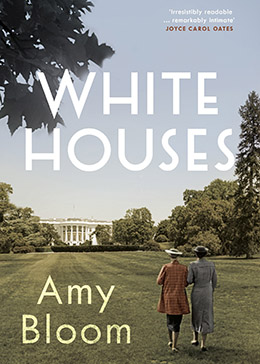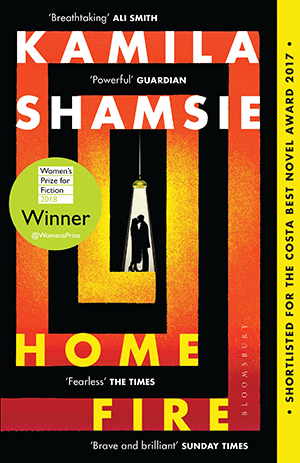Bringing you top new fiction picks, author interviews, discounts and lots more book chat, the Edition Book Club is a partnership with Cambridge Literary Festival and Heffers
White Houses by Amy Bloom
The second selection for our book club is by Amy Bloom, who spoke to Charlotte Griffiths

White Houses is a short, beautifully tender novel about the love affair and relationship between Lorena ‘Hick’ Hickock, the most prominent American female journalist of the 1930s, and Eleanor Roosevelt, First Lady of the United States. And though it’s a work of fiction, it’s based on fact. That alone should be enough to make your ears prick up with interest: it certainly grabbed Amy’s attention. “I actually came across the story about Eleanor and Lorena while I was researching my previous novel, Lucky Us,” she said. “The research was great fun: there’s just so much in American history about the Roosevelts, and I found myself so engaged with them – and then eventually became aware of this relationship.”
It turns out that this great love was no secret: The Roosevelt Library contains a staggering three thousand letters between Eleanor and Lorena which – as part of her research – Amy was permitted access to, further deepening her connection with the women’s story, and providing an insight into the intimate tone of their exchanges. “The letters are often quite specific, passionate and quite emotional,” she said, “I wasn’t looking to make an argument: I was looking to illuminate a middle-aged love affair. There are American historians around who did interview (Eleanor and Franklin’s) descendants specifically about Eleanor, but they asked questions like: ‘Do you think it was possible that your grandmother had a romantic relationship with Lorena Hicock?’ – which just struck me as most un-historian, not really in the ‘search for truth’ category. I didn’t repeat that behaviour.”
Amy’s previous fictional works have received extensive critical acclaim, but this is her first where real people play the starring roles – so she’s both excited and slightly nervous to see how the book is received. “Because there are real people who lived, who appear in the novel – I’m certainly aware that there’s going to be more focus on that,” she says. “It’s given me the chance to talk about the difference between history and fiction and why, if you have history, you might still want to write fiction.”

Fiction writers often don’t know how stories are going to end when they first begin the process of writing, and allow stories and characters to unfold – but does this approach differ when working with non-fictional subjects and historical facts? “You know the broad strokes,” Amy explained. “And in any kind of fiction you’re usually working with some set of facts: there’s almost always gravity, for example…
“This story is based on certain events that definitely happened: the Depression, the Second World War, Franklin’s death, and the fact that he was President of the United States – but these were the only things that felt like constraints to me. I know Franklin’s going to die: I know Lorena and Eleanor are not going to wind up on a porch together – but because it’s a novel, I could have them end up on a porch in a pair of rocking chairs, if that’s the novel I wanted to write.”
The resulting novel is captivatingly narrated by Hick, a straight-talking, tailored-suit-wearing, hard-boiled newspaperwoman, who reminisces over past meetings with Eleanor as if she’s sat next to you at a bar – while also gradually revealing more of her own punishingly bleak background. The story feels like a series of vignettes, deftly woven together, and richly textured with sensual prose: specific fragrances and flavours are beautifully depicted throughout. Food plays a large role in the novel, as Amy explained.
“If you’re willing to listen, people will tell you everything”
“I had picked up that Lorena did like to cook, and was a good cook, and that Eleanor was famously indifferent to food. The Roosevelt White House was notorious for serving terrible dinners: the joke was that it was an honour to be invited to the White House for dinner, but you had to make sure that you ate first. I wanted to contrast Eleanor’s always very self-conscious abstemiousness and indifference, and Franklin was someone who loved a good dinner – I think one of the ways she punished him [for his multiple affairs] was that the food was so terrible.”
Before Amy was a writer, she was a listener, and spent 20 years practising as a psychotherapist – leaving her with an acute awareness of the gaps between what people say and what they actually do. “People always ask me about being a psychotherapist, but it makes me laugh because they never ask about being a bartender, which I also was,” she explained. “If you are willing to listen, if you are interested in listening to people, people will tell you everything. That’s true regardless of your profession.”

Life as a psychotherapist was rewarding mainly because it permitted Amy regular access to her favourite subject – people. “My kids always say I have four subjects as a writer,” she laughed: “death, sex, love and family – which I think basically comes under the heading of people.”
But life as a writer isn’t half bad either: like many writers, Amy enjoys ‘having written’, and is still flattered and gratified whenever she crosses paths with her readers. “I’m still thrilled and gobsmacked that these people exist, that there are readers who are not related to me,” she said.
Amy battles tricky days by steadfastly refusing to give in. “I just crawl to my office,” she says. “Sometimes I write, sometimes I stare out the window, sometimes I read Pride and Prejudice –
but I feel like I have to be near my desk. That’s the obligation. I have to be able to put my hands on my desk. It’s a bit like being a subsistence farmer. You gotta get up, no matter what: you gotta show up, you gotta plant the seeds, to water, to weed, or your crops are going to fail – so nevertheless, you get up and show up. And every once in a while I get a good day as a writer where there’s a whole really good paragraph, and I know it’s going to stand. And that feels terrific.”
Book Club questions
Amy Bloom offers some discussion ideas
Did any historical information in the book interest or surprise you?
Did you identify with any of the characters or situations in particular?
Do you think the love affair between Eleanor and Lorena would resolve differently if it was happening in today’s society?
Were you familiar with Eleanor Roosevelt before reading this? Were you surprised by her politics and behaviour, considering the time she lives in?
Cathy Moore, director of Cambridge Literary Festival, on White Houses
I have never read anything by Amy Bloom before, despite having heard many good things about her writing, and was thus thrilled to receive an early copy of her latest novel White Houses. I devoured it in two sittings. It is a relatively short read but manages to convey a great sense of the political backdrop of the era whilst charting the little known love affair between Eleanor Roosevelt and Hick, a relationship which was mostly played out in the White House – a touching story of love in plain sight between two middle-aged women told with brio, tenderness and humour.
I have always loved the intersection between historical fact and fiction and reading White Houses will have you heading off for the history books to work out where the facts end and the fiction begins. Local writer Jill Dawson blends fact and fiction brilliantly well in her novels The Great Lover and The Crime Writer based around periods of the lives of Rupert Brooke and Patricia Highsmith respectively – both would make great companion pieces to this book.
Up next month: Home Fire by Kamilla Shamsie 
Next month’s book is Home Fire by Kamila Shamsie, the author of seven novels including In the City by the Sea (shortlisted for the John Llewellyn Rhys Prize) and Broken Verses; Burnt Shadows (shortlisted for the Orange Prize for Fiction). In Home Fire, we join Isma, Aneeka and Parvaiz, three siblings who’ve had nothing but each other for as long as they can remember. But darker, stronger forces will divide Parvaiz from his sisters and drive him to the other side of the world, as he sets out to fulfil the dark legacy of the jihadist father he never knew. Announced as winner of the Women’s Prize for Fiction 2018 and described as “brave and brilliant” by The Sunday Times, Home Fire explores the dynamics between faith, love and society in a richly spun novel full of dazzling moments.
Home Fire can be purchased for £8.99 in paperback. Read along and tweet us your thoughts
@cambsedition, with the hashtag #EditionBookClub for a chance to feature in the next issue.
Join the conversation: share your thoughts on Home Fire by tweeting us @cambsedition and hashtag #editionbookclub
IN ASSOCIATION WITH

GET 25{b486c5a37ab2d325d17e17d701cb2567b1ecd1814e8ceb33effa2a4f1f171d46} OFF CAMBRIDGE EDITION BOOK CLUB BOOKS AT HEFFERS BOOK SHOP ON TRINITY STREET

